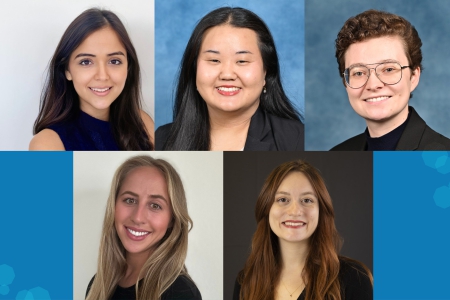UCLA’s inaugural Future of Food Fellows poised to advance the field of cellular agriculture
Key takeaways
- The Future of Food Fellows program, led by UCLA biophysicist Amy Rowat, launched its inaugural cohort for 2024-25 with funding for research and development of cultured meat.
- The program is designed to prioritize research and training in cellular agriculture, an emerging industry within the movement to build sustainable food systems.
- Fellows are chosen across disciplines, ranging from law and chemistry to engineering.
To solve the growing global food crisis, many companies are betting on cultured meat, which is grown from cells rather than taken from slaughtered animals. Although the movement has world-changing potential, a viable solution has yet to arrive on kitchen tables.
A new UCLA fellowship program seeks to help change that by positioning graduate students as future leaders in the emerging field of cellular agriculture. Spearheaded by biophysicist Amy Rowat, UCLA’s Marcie H. Rothman Professor of Food Studies, and managed by her campus-based organization Science&Food, the Future of Food Fellows program will unite students across disciplines to drive the field forward. Launching with five inaugural fellows for the pilot year 2024-25, the program has been supported by a one-time infusion of state funds to UCLA, UC Berkeley and UC Davis for research and development of cultured meat.
“We want to accelerate fundamental research and train the next-generation workforce to provide the talent and expertise for the industry — many companies in this space are based in California,” said Rowat, a professor of integrative biology and physiology in the UCLA College and a member of the bioengineering department in the UCLA Samueli School of Engineering. “There are increasing numbers of students who want to address the critical societal challenge of sustainable food systems, and this program provides an opportunity for them to get involved.”
The initiative represents UCLA’s latest step forward as a leader in food research, teaching and policy and builds on the launch of the UCLA Rothman Family Institute for Food Studies; Rowat was recently appointed the inaugural faculty director of the institute, which is housed within the UCLA Division of Undergraduate Education. In addition to providing funding support and training for early-career scientists, the one-year fellowship program offers networking and mentorship opportunities to aid in the development of their careers and to create a diverse, engaged community. Fellows may also request supplemental funding to support an undergraduate student researcher to work with them on their research project.
“Collaboration across disciplines is really critical to move these products from basic discovery to societal impact,” Rowat said.
The inaugural Future of Food Fellows cohort includes:
- Erika López-Lara, doctoral student, UCLA Department of Chemistry
- Justine Kim, doctoral student, UCLA School of Law
- Maria Trubetskaya, doctoral student, UCLA School of Law
- Ceci (Rebecca) Cohen, master’s student, UCLA Samueli School of Engineering
- Corinne Smith, doctoral student, UCLA Samueli School of Engineering
In designing the program, Rowat and her team drew inspiration from a model developed by the nonprofit research institute New Harvest, whose cohort of fellows has included one of Rowat’s own lab members, Stephanie Kawecki. Kawecki, a postdoctoral researcher in the integrative biology and physiology department, will serve as a mentor for the inaugural fellows together with Daniel Rosenfeld, a postdoctoral scholar in the UCLA Department of Psychology.
“I am thrilled that the Future of Food Fellows program will create new opportunities for UCLA’s outstanding students to develop solutions for sustainable food production,” said Adriana Galván, dean of undergraduate education. “With this forward-thinking initiative, Amy Rowat and her team have further positioned UCLA to create lasting positive outcomes for future generations, both in California and around the world.”
This article originally appeared in UCLA’s Newsroom.



 element5digital/unsplash
element5digital/unsplash Jood Simbawah
Jood Simbawah